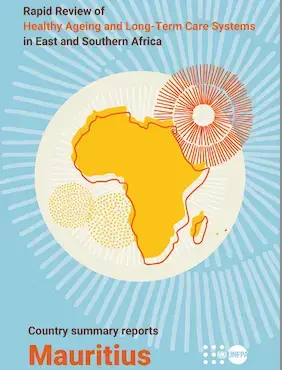Mauritius is a small island developing state which has a projected total population of 1.27 million, with approximately 234,361 (18.1 per cent)1 persons aged 60 years and over – the highest in East and Southern Africa (ESA) and in sub-Saharan Africa more broadly (United Nations Department of Economic and Social Affairs, 2019). This figure is projected to rise to 31 per cent by 2050, making its demographic composition more like Europe than elsewhere in Africa. This makes older people a significant political lobby group, as is visible in the policy and programmes in place which are quite different from those elsewhere in the ESA region.
The country has a well-established health and social protection system in place, which includes significant provision for older people. Despite being a small and relatively wealthy country, and therefore contextually different from many countries in the region, it nevertheless provides many examples of good practices in supporting older people in the African region in terms of investment in the older population and intersectoral collaboration.
This report provides an overview of population ageing and health trends in Mauritius, and assesses the readiness and responsiveness of health, social welfare and long-term care systems to ageing and the needs of older people in the country. It assesses the state of frameworks and structures in place to support healthy ageing and provides a set of recommendations to inform policy development and strategic interventions going forward.


